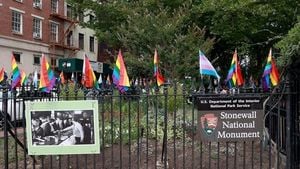The resilience of Leningrad's citizens is solemnly remembered each year on January 27, marking the 78th anniversary of the lifting of the German siege. This historic event, which lasted nearly 900 days from September 8, 1941, to January 27, 1944, stands as one of the most harrowing yet heroic narratives of World War II, etched deeply in the collective memory of Russia.
Across Russia, cities commemorated this tragic yet noble chapter with ceremonies and gatherings. One of the most poignant events took place at the Memorial of Glory in Barnaul, where officials and citizens alike gathered to lay flowers at memorials dedicated to the sacrifice of Leningrad's defenders and the resilience of its citizens. Local dignitaries such as Alexander Romanenko, the Chairman of the Altai Krai Legislative Assembly, and Igor Stepanenko, Deputy Chairman of the Altai Krai Government, were present, alongside veterans and volunteers from the 'Victory Volunteers' movement.
During the ceremony, Romanenko reflected on the significance of the day, stating, “Leningrad's blockade is the example of the greatest tragedy of millions of people and at the same time the symbol of unwavering courage and resilience.” The participation of veterans, many of whom survived the siege, added gravitas to the occasion.
Events were not limited to Barnaul; cities nationwide observed memorials, including the traditional laying of flowers at major monuments and memorials commemorated for their historical importance. The air was thick with the memories of those who had braved 872 days of relentless bombing and hardship. Leningraders endured the horrors of starvation and the chilling fear of constant artillery bombardment. During the worst months, rationing forced many to survive on just 125 grams of bread per day.
This year’s observance also highlighted the poignant history surrounding the 'Road of Life,' the sole route for shipments of food and supplies across the frozen Lake Ladoga during the harsh winters. Thousands of children were evacuated across this dangerous path, illustrating not just survival, but the determination to preserve the next generation.
The editorial of Eisk Info encapsulated the spirit of this remembrance: “Let this day remind us how important it is to cherish peace and value the freedom we have because of the courage and heroism of our ancestors.”
Memorials such as Piskarevsky Cemetery serve as poignant reminders of the cost of war; the cemetery is the final resting place for hundreds of thousands of Leningrad's fallen. The epitaph of Olga Berggolts, “Their names cannot be forgotten,” resonates deeply with those present, marking the day with respect and reflection.
These commemorative gatherings serve as more than just memories of past suffering; they reiterate the continued vigilance against the forces of indifference and division—elements which often lead to the rise of such conflicts. The shared experiences of the blockade need to be felt not only as history but as lessons for contemporary society.
The acknowledgment of the siege also includes remembering those who served from all corners of the Soviet Union, whose contributions were significant. Reports indicate individuals from various regions played integral roles, including residents from regions far from Leningrad itself. They fought bravely, contributing to the protective ring around the city.
Today, as demonstrations and ceremonies played out beneath grey skies across Russia, stories were shared—not only about the struggles endured but also about the unbreakable spirit of people united against adversity. Each story added layers to the narratives celebrated every January 27.
With the world still reeling from the impacts of conflict and divisiveness, the lessons of the Leningrad blockade are more relevant than ever. It stands as a reminder of human endurance and the indomitable will to survive against overwhelming odds. The echoes of those turbulent years are suffused with the bravery of those who fought, offering inspiration for current and future generations.
Each January, as voices rise to commemorate the 900-day siege, there is hope—a hope to nurture peace and remembrance of those dark days, ensuring they never fade from the fabric of collective history. Today, the legacy of Leningrad lives on, drawing strength from the shadows of its past to illuminate the paths of freedom and unity for all.



